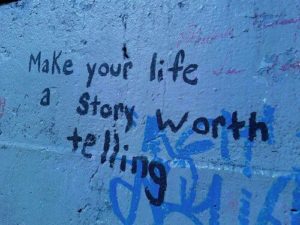One way to measure [a leader’s] self-awareness is by looking at their ability to tell their life story in a coherent way. ~Fred Kiel
 The quote from Fred Kiel is not opinion; it is based on research. The same conclusion has been stated by numerous experts and research studies. So it’s not surprising that the advice in Psychology Today mirrors the perspectives cited in Fast Company, Forbes, and other business publications. They all start with your life story; can you tell it in a coherent way? Coherent means that you are able to integrate your life experiences into your sense of self, who you are today.
The quote from Fred Kiel is not opinion; it is based on research. The same conclusion has been stated by numerous experts and research studies. So it’s not surprising that the advice in Psychology Today mirrors the perspectives cited in Fast Company, Forbes, and other business publications. They all start with your life story; can you tell it in a coherent way? Coherent means that you are able to integrate your life experiences into your sense of self, who you are today.
On a number of occasions, I’ve used a question for leadership teams to get to know one another. That question is simply, “What was your most interesting or difficult challenge as a child?” This not only allows teams to get to know one another but it’s also a way for me to quickly see who might be struggling with self-awareness. It’s not uncommon for at least one member of the team to answer this question with “I can’t think of anything.” That usually means one of two things. Either there was something quite challenging and they aren’t comfortable enough yet to say it to the team, or they really can’t think of anything. Either way, there may be some issues around self-awareness. There’s at least one thing we can all think of in the first 18 years of our life that might be interesting or difficult. If we’re self-aware, then we’ve been able to integrate those experiences into our sense of self so we shouldn’t fear talking about it.
Psychologist Dr. Todd Hall provides this outline for self-reflection to develop your ability to tell your story.
Reflecting on your life journey is the way you integrate all your experiences, both positive and painful, into your sense of self. Think through what some of the most formative experiences of your life have been. How have they shaped you and your guiding principles for life and leadership? When you look someone in the eyes and communicate your story, it activates your social brain and deeper aspects of your sense of self. Here are some questions and categories to help you reflect on your life journey.
QUESTIONS FOR SELF-REFLECTION
- What are the chapters of your life? How would you title them? What does this reveal about you?
- What are the key events of your life?
- Peak experience
- Low point
- Key turning points
- Earliest memory
- An important childhood memory
- An important adolescent memory
- An important adult memory
- Significant People
- Describe four of the most significant people in your life story
- Tell me about any particular heroes or heroines
- Future Goals
- Core challenges
- Personal ideology or worldview
- Deeper themes of your work
What’s your story?